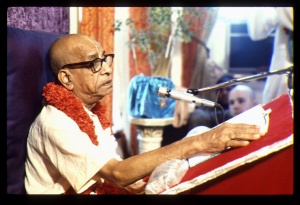CC Madhya 8.182: Difference between revisions
m (1 revision(s)) |
No edit summary |
||
| Line 1: | Line 1: | ||
{{ | [[Category:Sri Caitanya-caritamrta - Madhya-lila Chapter 08|C182]] | ||
<div style="float:left">'''[[Sri Caitanya-caritamrta|Śrī Caitanya-caritāmṛta]] - [[CC Madhya|Madhya-līlā]] - [[CC Madhya 8|Chapter 8: Talks Between Śrī Caitanya Mahāprabhu and Rāmānanda Rāya]]'''</div> | |||
<div style="float:right">[[File:Go-previous.png|link=CC Madhya 8.181|Madhya-līlā 8.181]] '''[[CC Madhya 8.181|Madhya-līlā 8.181]] - [[CC Madhya 8.183-184|Madhya-līlā 8.183-184]]''' [[File:Go-next.png|link=CC Madhya 8.183-184|Madhya-līlā 8.183-184]]</div> | |||
{{CompareVersions|CC|Madhya 8.182|CC 1975|CC 1996}} | |||
{{RandomImage}} | |||
==== TEXT 182 ==== | ==== TEXT 182 ==== | ||
<div | <div class="verse"> | ||
kā kṛṣṇasya praṇaya-jani-bhūḥ śrīmatī rādhikaikā | :kā kṛṣṇasya praṇaya-jani-bhūḥ śrīmatī rādhikaikā | ||
kāsya preyasy anupama-guṇā rādhikaikā na cānyā | :kāsya preyasy anupama-guṇā rādhikaikā na cānyā | ||
jaihmyaṁ keśe dṛśi taralatā niṣṭhuratvaṁ kuce ’syā | :jaihmyaṁ keśe dṛśi taralatā niṣṭhuratvaṁ kuce ’syā | ||
vāñchā-pūrtyai prabhavati hare rādhikaikā na cānyā | :vāñchā-pūrtyai prabhavati hare rādhikaikā na cānyā | ||
</div> | </div> | ||
| Line 14: | Line 18: | ||
==== SYNONYMS ==== | ==== SYNONYMS ==== | ||
<div | <div class="synonyms"> | ||
''kā''—who; ''kṛṣṇasya''—of Lord Kṛṣṇa; ''praṇaya-jani-bhūḥ''—the birthplace of love of Kṛṣṇa; ''śrīmatī''—all-beautiful; ''rādhikā''—Śrīmatī Rādhārāṇī; ''ekā''—alone; ''kā''—who; ''asya''—His; ''preyasī''—most dear friend; ''anupama-guṇā''—having unparalleled qualities; ''rādhikā''—Śrīmatī Rādhārāṇī; ''ekā''—alone; ''na''—not; ''ca''—also; ''anyā''—anyone else; ''jaihmyam''—crookedness; ''keśe''—in the hair; ''dṛśi''—in the eyes; ''taralatā''—unsteadiness; ''niṣṭhuratvam''—firmness; ''kuce''—in the breasts; ''asyāḥ''—Her; ''vāñchā''—of the desires; ''pūrtyai''—to fulfill; ''prabhavati''—manifests; ''hareḥ''—of Lord Kṛṣṇa; ''rādhikā''—Śrīmatī Rādhārāṇī; ''ekā''—alone; ''na''—not; ''ca anyā''—anyone else. | |||
</div> | </div> | ||
| Line 21: | Line 25: | ||
==== TRANSLATION ==== | ==== TRANSLATION ==== | ||
<div | <div class="translation"> | ||
“‘If one asks about the origin of love of Kṛṣṇa, the answer is that the origin is in Śrīmatī Rādhārāṇī alone. Who is the most dear friend of Kṛṣṇa? The answer again is Śrīmatī Rādhārāṇī alone. No one else. Śrīmatī Rādhārāṇī’s hair is very curly, Her two eyes are always moving to and fro, and Her breasts are firm. Since all transcendental qualities are manifested in Śrīmatī Rādhārāṇī, She alone is able to fulfill all the desires of Kṛṣṇa. No one else.’ | “‘If one asks about the origin of love of Kṛṣṇa, the answer is that the origin is in Śrīmatī Rādhārāṇī alone. Who is the most dear friend of Kṛṣṇa? The answer again is Śrīmatī Rādhārāṇī alone. No one else. Śrīmatī Rādhārāṇī’s hair is very curly, Her two eyes are always moving to and fro, and Her breasts are firm. Since all transcendental qualities are manifested in Śrīmatī Rādhārāṇī, She alone is able to fulfill all the desires of Kṛṣṇa. No one else.’ | ||
</div> | </div> | ||
| Line 28: | Line 32: | ||
==== PURPORT ==== | ==== PURPORT ==== | ||
<div | <div class="purport"> | ||
This is a quotation from Śrī Govinda-līlāmṛta (11.122) by Kṛṣṇadāsa Kavirāja Gosvāmī. It is a verse in the form of questions and answers describing the glories of Śrīmatī Rādhārāṇī. | This is a quotation from ''Śrī Govinda-līlāmṛta'' (11.122) by Kṛṣṇadāsa Kavirāja Gosvāmī. It is a verse in the form of questions and answers describing the glories of Śrīmatī Rādhārāṇī. | ||
</div> | </div> | ||
__NOTOC__ | |||
<div style="float:right; clear:both;">[[File:Go-previous.png|link=CC Madhya 8.181|Madhya-līlā 8.181]] '''[[CC Madhya 8.181|Madhya-līlā 8.181]] - [[CC Madhya 8.183-184|Madhya-līlā 8.183-184]]''' [[File:Go-next.png|link=CC Madhya 8.183-184|Madhya-līlā 8.183-184]]</div> | |||
__NOTOC__ | |||
__NOEDITSECTION__ | |||
Revision as of 11:32, 18 August 2021

A.C. Bhaktivedanta Swami Prabhupada
TEXT 182
- kā kṛṣṇasya praṇaya-jani-bhūḥ śrīmatī rādhikaikā
- kāsya preyasy anupama-guṇā rādhikaikā na cānyā
- jaihmyaṁ keśe dṛśi taralatā niṣṭhuratvaṁ kuce ’syā
- vāñchā-pūrtyai prabhavati hare rādhikaikā na cānyā
SYNONYMS
kā—who; kṛṣṇasya—of Lord Kṛṣṇa; praṇaya-jani-bhūḥ—the birthplace of love of Kṛṣṇa; śrīmatī—all-beautiful; rādhikā—Śrīmatī Rādhārāṇī; ekā—alone; kā—who; asya—His; preyasī—most dear friend; anupama-guṇā—having unparalleled qualities; rādhikā—Śrīmatī Rādhārāṇī; ekā—alone; na—not; ca—also; anyā—anyone else; jaihmyam—crookedness; keśe—in the hair; dṛśi—in the eyes; taralatā—unsteadiness; niṣṭhuratvam—firmness; kuce—in the breasts; asyāḥ—Her; vāñchā—of the desires; pūrtyai—to fulfill; prabhavati—manifests; hareḥ—of Lord Kṛṣṇa; rādhikā—Śrīmatī Rādhārāṇī; ekā—alone; na—not; ca anyā—anyone else.
TRANSLATION
“‘If one asks about the origin of love of Kṛṣṇa, the answer is that the origin is in Śrīmatī Rādhārāṇī alone. Who is the most dear friend of Kṛṣṇa? The answer again is Śrīmatī Rādhārāṇī alone. No one else. Śrīmatī Rādhārāṇī’s hair is very curly, Her two eyes are always moving to and fro, and Her breasts are firm. Since all transcendental qualities are manifested in Śrīmatī Rādhārāṇī, She alone is able to fulfill all the desires of Kṛṣṇa. No one else.’
PURPORT
This is a quotation from Śrī Govinda-līlāmṛta (11.122) by Kṛṣṇadāsa Kavirāja Gosvāmī. It is a verse in the form of questions and answers describing the glories of Śrīmatī Rādhārāṇī.